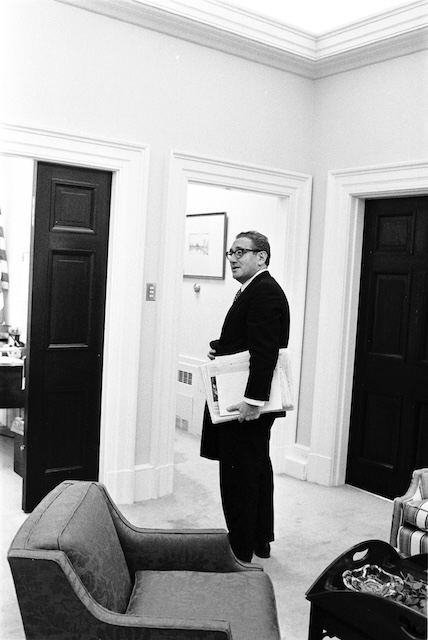Introduction
After the communist revolution in Cuba in 1959 (Kennedy and Operation MONGOOSE), U.S. leaders were determined to prevent the rise of additional communist regimes in Latin America. This goal was consistent with the long-standing policy of containment (See Kennan and Truman), but it complicated inter-American relations. The United States, for example, pressured other nations in the Western Hemisphere, including Chile, to break all ties with Cuba.
Chile was a constitutional democracy. It also had active communist and socialist parties (though the communist party was banned from 1948 – 1957). Foreign corporations owned 25 percent of Chile’s industry and dominated the most important sector of the economy, copper mining. In September 1970, in a three-way race, Salvador Allende won a plurality of votes for president. This meant that the Chilean Congress had to decide among the candidates, which by custom meant choosing the one who had received the most votes. Allende assumed office in November 1970. Allende promised to implement a political and economic program he called the “Chilean Road to Socialism” that included more state control of the economy and nationalization of the copper industry. Though a drastic economic change, this program was implemented through Chile’s established governing framework; Allende relied on a left-wing coalition government to pass the necessary laws.
Allende was not a communist, but his actions greatly alarmed the Nixon administration, as seen in this conversation between Nixon’s National Security Adviser, Henry Kissinger, and his Secretary of State, William Rogers. Speaking just after it appeared that Allende had won Chile’s election, the officials made it clear that they wanted to prevent Allende from taking office and that they were willing to use covert operations to achieve this goal (See NSC 5412/2). This was not the only time during the Cold War that the United States took action against a regime it saw as a threat (See Operation MONGOOSE). For the outcome of the U.S. actions taken in response to Allende’s election, see the introductory note for Nixon and Kissinger.
—David Krugler
Source: National Security Archive, Electronic Briefing Book no. 255 (September 10, 2008). Available at https://goo.gl/Bfwimb.
[Rogers]: Okay. On Chile, CIA has prepared a paper with general conclusions which I think are pretty good – our people agree. But whatever we do, I think there are two things we should take into consideration: one, we want to be sure the paper record doesn’t look bad. No matter what we do it will probably end up dismal. So our paper work should be done carefully. [Next sentence blacked out in original.] I talked with the President [Nixon] at length about it. My feeling – and I think it coincides with the President’s – is that we ought to encourage a different result from the _________ [blank in original] but should do so discreetly so that it doesn’t backfire.
[Kissinger]: The only question is how one defines “backfire.”
[Rogers]: Getting caught doing something. After all we’ve said about elections, if the first time a Communist wins the U.S. tries to prevent the constitutional process from coming into play we will look very bad.
[Kissinger]: The President’s view is to do the maximum possible to prevent an Aliente [Allende] takeover, but through Chilean sources and with a low posture.
[Rogers]: I have been disturbed by Corry’s [Korry’s] telegrams. They sound frenetic and somewhat irrational. I know that he’s under pressure but we ought to be careful of him. He’s got tender nerve ends. I don’t know if you saw his telegrams.
[Kissinger]: Yes, I did.
[Rogers]: And I think we’ve got to be sure he acts with discretion. He’s a high-strung fellow.
[Kissinger]: I think what we have to do is make a cold-blooded assessment, get a course of action this week some time and then get it done.
[Rogers]: I talked to [name removed in original]. I think it’s important that he understand that what he’s doing is not his doing but encouraging the Chileans to do what they should. If it’s our project as distinguished from Chilean it’s going to be bad from us. I’m not sure he’s the best man to do it. I’m not sure he’s the most discreet fellow. [Next sentence blacked out in original.]
[Kissinger]: Is it?
[Rogers]: Not that I know of right now. We ought, as you say, to cold-bloodedly decide what to do and then do it.

































































































































































































































































